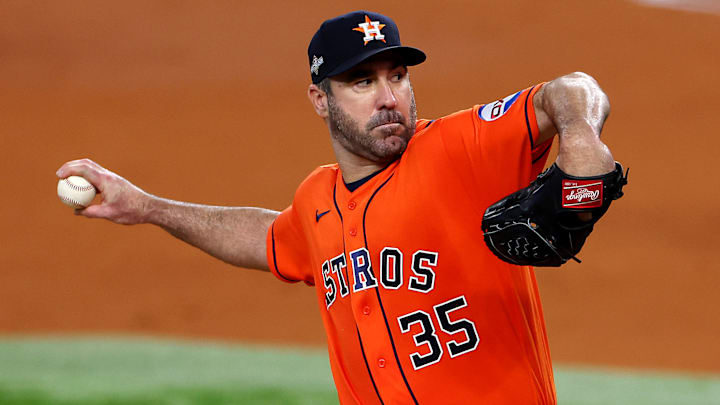When the Houston Astros brought back Justin Verlander at the trade deadline last year, everyone involved understood the cost.
Not only is Verlander owed a healthy chunk of change over the next couple of years, but giving up two high-end outfield prospects in Drew Gilbert and Ryan Clifford was an obvious blow to the Astros' already depleted farm system. The Mets did throw in some cash to help the cause, but adding Verlander still required a massive investment from Houston's side.
At the end of the day, that's what it costs to acquire a guy with Verlander's pedigree. He's one of the best pitchers of his generation who also happened to be a guy that Houston was intimately familiar with. Even as he has aged and gotten banged up, he still isn't a guy that any team wants to see on the mound against them.
Still, there is opportunity cost with any move like this. The Astros' resources are finite like most teams (although signing Hader did indicate that those limitations are somewhat flexible), so when one big move is made, it closes the door to other opportunities. In Houston's case, it may have kept them from making a real push to trade for Dylan Cease this offseason.
Astros-Mets Justin Verlander trade hurts Houston's pursuit of Dylan Cease
General manager Dana Brown has been clear that the Astros would like to add another arm before the start of the season. As of this moment, Cease is the best arm that has been publicly available on the trade market. Given the Astros' previous interest in Cease at last year's trade deadline, Houston continuing to try and nab him would make all the sense in the world, right?
Unfortunately, Houston's pursuit of Cease at this point in time is basically a nonstarter because of the Verlander deal. Giving up two top prospects from a thin system has made any big trade like that very difficult to pull off even if the White Sox like Jacob Melton enough to make him the centerpiece of a trade package. The Astros have to think about the future as well, after all.
In some ways, the Astros may be better off staying out of the Cease bidding even if they hadn't gone out and snatched Verlander. Cease is far from a sure thing as there were some troubling downward trends from his 2023 season. He will certainly end up being cheaper in terms of dollars than Verlander, but Chicago is asking for the sun and the moon for a guy that has more potential than an actual track record. In Cease's five seasons in the big leagues, only his 2022 campaign stands out as particularly strong, and his 2023 season was a disappointment.
Still, one cannot help but wonder if the Astros were too hasty in pushing their chips in on Verlander. Trading for Cease at the White Sox's current price point may be a mistake either way, but Verlander got hit harder than he ever has last year and his strikeout rate has trended downward since 2019. He is a surefire Hall of Famer, which is helpful from a marketing standpoint, but he's still a 40-year-old pitcher with a fairly recent arm injury whose production is going in the wrong direction. And now he's dealing with a shoulder issue with spring training already here.
We'll know soon enough if the Astros ultimately made the right choice as spring training gets under way this week. However, it's clear that by choosing Verlander last year, it may have cost the Astros the ability to seriously pursue other big splashes like trading for Cease.
